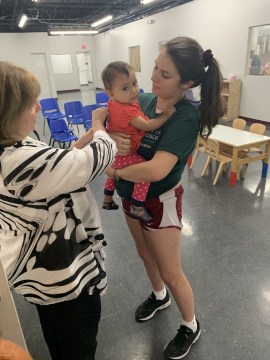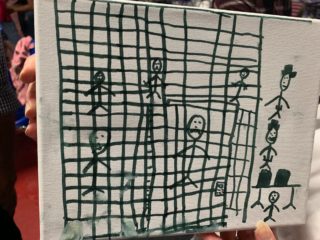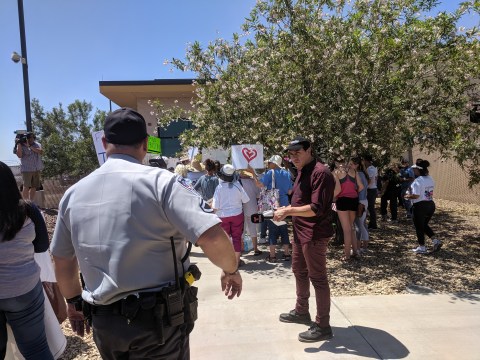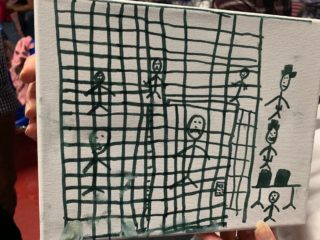A Georgia physician who visited migrant border facilities last month says she was alarmed by the signs of children’s stress there.

Dr. Sally Goza of Fayetteville, president-elect of the American Academy of Pediatrics, said Monday that the visit by herself and other pediatricians underscored the organization’s position that the Border Patrol facilities are not a good place for children, and that kids should be there for as short a time as possible.
“We believe that pediatricians should be there to care for the children,’’ Goza added.
She talked of a boy crying inconsolably at a migrant processing center in Ursula, Texas, after his father had been taken away for a court proceeding. The boy, who had crossed the border with his father, didn’t know how to get in touch with him. The boy “didn’t know what to do,’’ Goza said. “It was heartbreaking.’’
There were about 900 unaccompanied children there at the Ursula center, Goza said. “There were two little sisters, 3 or 4 or 5, with no expressions on their face. That young, you would think they would have expressions. They were holding their hands together so tightly that their knuckles were almost white.’’
At a respite center, a toddler who had just left a Border Patrol facility looked sick. “She had a fever and breathing problems,’’ Goza said. The girl was sent to a hospital, where she was diagnosed with pneumonia and a congenital heart lesion.
Pediatricians who have visited the border facilities have raised strong concerns about the treatment of children at the migrant detention centers.
Over the past five years, tens of thousands of children — mainly from Mexico, Honduras, Guatemala and El Salvador — have crossed the U.S. border, seeking relief from violence and poverty.
From October 2018 through May of this year, more than 230,000 children have been apprehended at the border, CNN reported. Of those, about 170,000 were accompanied by a parent or legal guardian.
The Trump administration has agreed to allow a Stanford pediatrician to conduct an independent investigation into health conditions for migrant children at Customs and Border Protection facilities.

The pediatrician, Dr. Paul Wise, toured detention centers at the border last summer and was critical of the conditions there. Since September, four children have died while in CBP custody or shortly after being released from it, CNN reported.
Goza spoke of cage-like confinement of families at the processing centers she visited.
According to court filings, Dr. Dolly Sevier, a pediatrician in Brownsville, Texas, who visited children in a detention center, said they were kept in conditions that included “extreme cold temperatures, lights on 24 hours a day, no adequate access to medical care, basic sanitation, water or adequate food,” CNN reported.
Migrant children are supposed to be kept in Border Patrol custody for no more than 72 hours. But a recent report found that nearly a third of children in the facilities inspected were kept longer than that period of time.
In early June, Acting Homeland Security Secretary Kevin McAleenan told CNN that the facilities were overcrowded and “not an appropriate setting for kids.”
Last week, he told CNN that “we’ve been taking action” and that the agency was providing “additional medical care” from more than 200 certified providers. A Border Patrol spokesperson said that includes nurse practitioners, physician assistants, emergency medical technicians, certified medical assistants and other medical support personnel.
A new report released Friday by the House Oversight and Reform Committee, meanwhile, said at least 18 migrant infants and toddlers under the age of 2, including nine infants under the age of 1, were separated from their parents at the southern border as part of the Trump administration’s “zero tolerance” policy on illegal entry into the country.
Those infants and toddlers were kept apart from their parents for periods ranging from 20 days to six months, the report found.
The Wall Street Journal reported that as recently as a few weeks ago, migrant minors reported being in crowded, unclean Border Patrol cells for nearly a month without regular access to food, showers and medical care, according to lawyers and advocates. Border Patrol agents have disputed those reports.
The Ursula facility had a strong smell of sweat, urine and feces, Goza said. The children’s eyes were bloodshot and bulging. “There was very little talking and communicating.”

Goza has reviewed drawings by children who have left detention facilities. “A child will draw what they feel. They drew cages, guards looking down on them,’’ she said.
Detained children can face high levels of physical and emotional stress, which can lead to developmental delays and behavior problems, Goza said. “Toxic stress can change the architecture of a child’s brain. It really changes their childhood.’’ A lack of sleep can lower the ability to fight off infections, she added.
Border Patrol staff are not medical professionals, Goza said. “They don’t know how to evaluate a child’s health. These people are not pediatric-trained.’’
“We need to make sure pediatricians are there.’’


